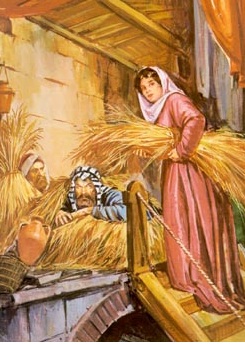Here are John the Baptist’s words to those who asked what they needed to do to enter into the kingdom of God:
John answered, “Anyone who has two shirts should share with the one who has none, and anyone who has food should do the same.”
Even tax collectors came to be baptized. “Teacher,” they asked, “what
should we do?” “Don’t collect any more than you are required to,” he
told them.
Then some soldiers asked him, “And what should we do?” He replied,
“Don’t extort money and don’t accuse people falsely–be content with
your pay.”
What was the problem according to John? If Kingdom is the answer, what is the problem?
Here it is again: the solution is a spiritual and social resolution to a spiritual and social problem. Israelites had turned at one another’s throats and John calls them to care for one another, to live in a community the way God wants them to live. Repentance is more than feeling bad about your sins, though it involves that. For John, repentance looks real: sharing extra possessions to take care of those in need, collecting a just tax, and ending the abusive use of power. When we talk about repentance today – the kind of repentance that leads to baptisms – the kind of repentance that leads to salvation, do we say “share your possessions, don’t extort, be satisfied with your pay?” or do we have other things in mind? I think we will nearly all admit that we have other things in mind.
I wonder more and more how much damage the little gospel we have been preaching is doing to the church. And I dream of the day when the gospel we preach is as big as the Bible’s Story. We have only sketched Mary and John, and we have not yet gotten to Jesus, but if we stop right now we get this: If kingdom is the solution, the problem it resolved was comprehensive injustice – before God, before the self, before others, and therefore with the world. Some may be tempted to tame these passages by suggesting they are pre-Jesus or pre-Cross or pre-Pentecost. Luke’s wiki-story, though, will keep this blue parakeet alive from the days of Mary to the days of the early Jerusalem community of faith.
Jesus preaching kingdom
I’ll get to Jesus tomorrow. I set that up with this story: As a freshly minted high school convert my youth pastor asked me to do a talk at our youth meeting during our weekly Wednesday prayer meeting. I prayed and prepared and preached about a text that was perhaps the most significant text in my Bible at the time: “Be ye separate.” The text was from 2 Corinthians 6:17 where we discover that the text is actually a quotation from Isaiah 52:11 with a considerably different meaning than what I wanted to bring up. That didn’t matter to me because I was standing on a firm, fundamentalist foundation called “the doctrine of separation.” That doctrine was a puzzle I inherited and it gave me what I thought I should say. My exhortation was entirely wrapped up in urging my fellow youth members to avoid alcohol and marijuana and other evil temptations like dancing, dating Roman Catholics, liberals and Lutherans, and attending Hollywood movies. We were dead-set against dancing because it was reported that it led to premarital sex. We weren’t sure if it did since we didn’t dance … but the rumors were rampant. I’m no more ashamed of what I said then than I am proud of it now. It’s the way I was; it was what I knew.

